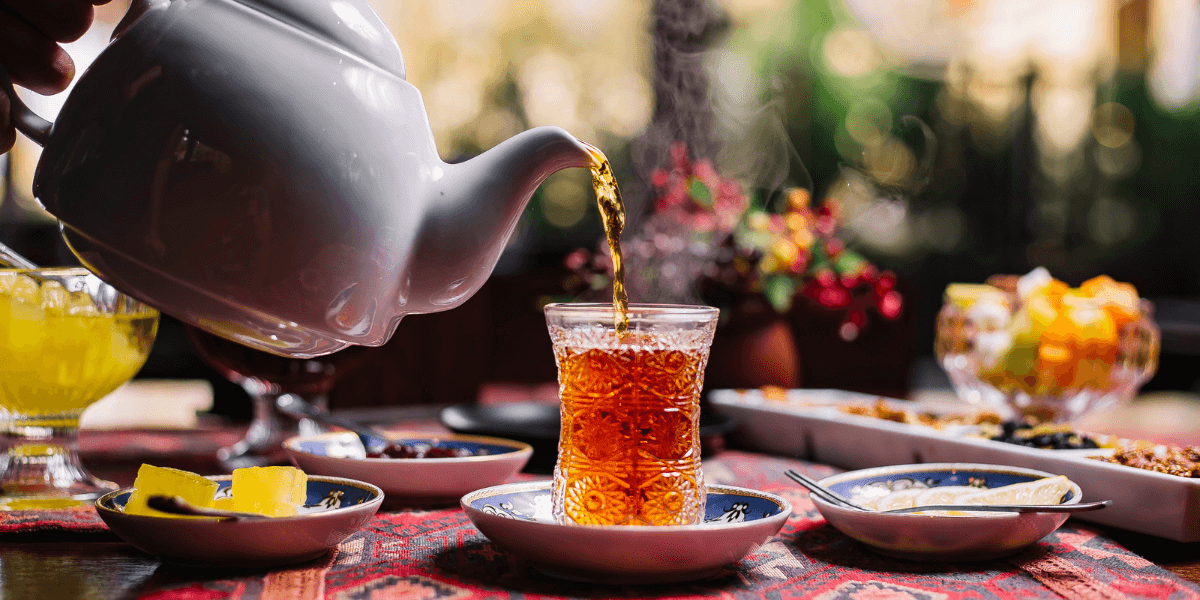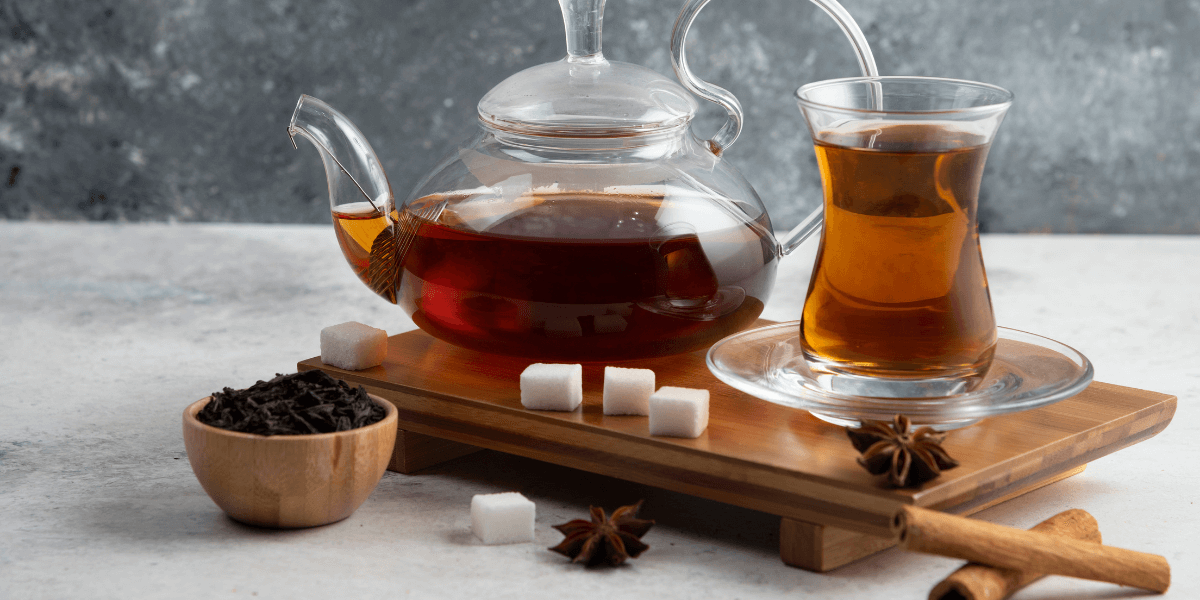Black tea is one of the most popular beverages around the world, not only for its rich and bold flavor but also for its numerous health benefits. But how many cups of black tea should you drink per day? And is there a specific time of day that is best for drinking black tea? In this article, we will explore the ideal amount of black tea to consume daily, the best time of day to drink it, how to brew the perfect cup, and much more. Whether you're a tea lover or just starting to explore the world of tea, this article will provide you with all the information you need to make the most of your black tea drinking experience.
Health Benefits of Drinking Black Tea
If you're looking for a simple way to boost your health, look no further than a cup of black tea. Here are just a few of the health benefits associated with drinking black tea:
Antioxidant Properties
Black tea is rich in antioxidants known as polyphenols, which help to protect your body against damage from harmful molecules called free radicals. These antioxidants have been linked to a reduced risk of many chronic diseases, including heart disease, cancer, and diabetes.
Boosts Immune System
The compounds found in black tea have been shown to strengthen the immune system and help fight off infections. In fact, some studies have found that drinking black tea may be particularly beneficial for preventing the common cold and flu.
Lowers Risk of Chronic Diseases
Regular consumption of black tea has been linked to a lowered risk of several chronic illnesses, including heart disease and diabetes. This is likely due to the high levels of antioxidants and other beneficial compounds found in the tea.
The Ideal Amount of Black Tea to Drink Daily
While black tea has plenty of health benefits, it's important to keep in mind that there can be too much of a good thing. Here's what you need to know about how much black tea to drink:
Recommended Daily Intake
Experts generally recommend drinking no more than 3-4 cups of black tea per day. This amount is associated with the most significant health benefits while minimizing the risk of negative side effects.
Possible Side Effects of Drinking Too Much Black Tea
While black tea is generally safe for most people, drinking too much can cause negative side effects such as headaches, nausea, and an increased risk of osteoporosis. Additionally, some people are more sensitive to the caffeine found in black tea than others and may experience jitteriness or insomnia.
The Best Time to Drink Black Tea
When it comes to timing your tea intake, there are a few things to keep in mind:
Morning vs. Afternoon vs. Evening
Many people enjoy a cup of black tea in the morning to help start their day on the right foot. However, black tea is also a great pick-me-up in the afternoon when energy levels may start to dip. Drinking black tea in the evening may interfere with sleep, so it's generally best to avoid drinking it close to bedtime.
Tea and Sleep
While drinking black tea in the evening may not be ideal for everyone, some people find that a cup of tea before bed helps them relax and sleep more soundly. If you're sensitive to caffeine, look for decaf black tea or consider trying a different type of tea altogether, such as herbal tea.
Different Ways to Enjoy Your Black Tea
There's no one "right" way to enjoy black tea - it all comes down to personal preference. However, here are a few things to keep in mind:
Additives: Honey, Lemon, or Milk?
While black tea tastes great on its own, some people like to add a touch of sweetness with honey or a bit of tanginess with lemon. Adding milk to black tea is a popular tradition in many cultures and can help to balance out the bitterness of the tea.
Cold Brew vs. Hot Brew
If you're looking for a refreshing summer drink, try cold brewing your black tea. Simply steep tea bags in cold water for several hours and enjoy over ice. Alternatively, you can brew your tea hot and pour it over ice for a quick and easy iced tea.
Black Tea vs. Coffee: Which is Better for You?
Are you a coffee lover who's considering making the switch to black tea? Or are you already a fan of black tea, wondering if you're missing out on anything by not drinking coffee? Let's compare the two.
Caffeine Content
Black tea contains less caffeine than a cup of coffee, but enough to help you stay awake and alert throughout the day. It's a great alternative to coffee if you're sensitive to caffeine or looking to reduce your caffeine intake.
Health Benefits and Risks
Both black tea and coffee have health benefits and risks. Black tea contains antioxidants that help protect against cancer, heart disease, and stroke, while coffee has been linked to a lower risk of Parkinson's disease and liver cancer. However, both beverages can also have negative effects on your health if consumed in excess, such as increasing your risk of acid reflux and anxiety.
Taste and Flavor Differences
Black tea has a bold, robust flavor with hints of earthiness and sweetness. It also has a natural sweetness that can be enhanced with a little bit of honey or sugar. Coffee, on the other hand, has a stronger and more bitter taste that some people find overpowering. It also has a wide variety of flavors depending on the type of beans used and the brewing method.
How to Brew the Perfect Cup of Black Tea
Now that you've decided to try black tea, it's important to know how to make the perfect cup.
Choosing the Right Type of Tea
There are many types of black tea, each with its own distinct flavor and aroma. Some popular varieties include English Breakfast, Earl Grey, Darjeeling, and Assam. Experiment with different types to find the one that suits your taste.
Temperature and Steeping Time
To get the best flavor and aroma from your black tea, it's important to steep it at the right temperature and for the right amount of time. Generally, black tea should be steeped in boiling water for 3-5 minutes, depending on the type of tea.
Teapot vs. Teabag: Which is Better?
While tea bags are convenient, loose-leaf tea brewed in a teapot provides a better flavor and aroma. It also gives you more control over the strength of your tea. However, if you're on-the-go or short on time, teabags are a great option.
Frequently Asked Questions about Drinking Black Tea
Still have some questions about drinking black tea? Here are some answers to frequently asked questions.
Is Black Tea Safe for Pregnant Women?
Black tea is safe for pregnant women in moderate amounts, as it contains less caffeine than coffee. However, it's important to consult with your healthcare provider before consuming any caffeine during pregnancy.
Can I Drink Black Tea if I Have High Blood Pressure?
If you have high blood pressure, you should limit your caffeine intake. While black tea has less caffeine than coffee, it's still important to monitor your intake and talk to your healthcare provider about your caffeine consumption.
Does Black Tea Stain My Teeth?
Like coffee, black tea can stain your teeth over time. However, you can minimize staining by drinking through a straw or by brushing your teeth regularly. You can also try brushing your teeth with baking soda once a week to remove any stains.In summary, drinking black tea in moderation can have positive effects on your health and wellbeing. By following the guidelines on daily intake and brewing the perfect cup, you can fully enjoy the rich and bold flavor of this popular beverage. Remember to experiment with different additives and brewing methods to find your perfect cup of black tea. Whether you choose to drink it in the morning, afternoon, or evening, black tea is a comforting and delicious drink that can be enjoyed any time of day.





